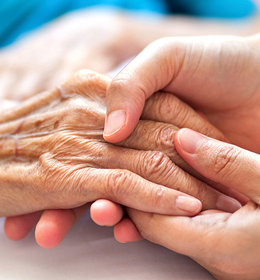
Earlier this month, when my almost-90-year-old father fell ill suddenly, I learned anew that engaging patients and family members in medical care is vital, rewarding and challenging. As a writer and editor, I have focused on patient safety and quality improvement, including the role of patients and family members, since 2004. Although well prepared to navigate the healthcare system and facilitate patients and family members engaged in the process, I felt challenged by my family’s recent experience. I dropped the ball more than a few times. Talking about engagement is one thing; achieving and sustaining it is something else.
My family’s recent experience with the healthcare system had its ups and downs. My dad was extraordinarily engaged and proactive about some aspects of his situation, especially facing a crisis.
Dad is creative and practical and summoned remarkable strength when tested. Following an early morning episode of vertigo at home, where he live alone, he went to the emergency department via ambulance and checked out OK. He returned home, decided to have something to eat and began heating up some leftover soup. When he reached for another can of soup, stored on a low shelf, vertigo struck again. Down he went! Lying on the floor, bleeding and stunned from the fall, he smelled something burning—the soup in a pan on the stove. Unable to stand, he fished another pot out of a cupboard. He knocked the pan off the hot burner (and not onto himself or the floor) and eventually pulled himself up enough to reach the controls and turn the burner off. Then he again called 911.
Having experienced vertigo, fallen, prevented a fire, called himself an ambulance twice in one day, and been admitted to the hospital, Dad was pretty worn out. He was happy to have me act as his advocate when I arrived from out of town.
Overall, things went well at the hospital. The inpatient advocate and ED nurse manager listened carefully to my feedback about some aspects of Dad’s care that I thought could have gone better and wanted to bring to their attention. The nurse manager returned my call promptly and betrayed no time pressure or doubt as I told him our stories. I felt heard. Being treated with respect helped me present my feedback as accurately and efficiently as possible.
The Quiet Challenges
The biggest challenges were not the gaps and lapses I reported in my feedback, nor the burning soup, as dangerous as that was. The challenge for me as advocate and caregiver, especially when Dad was discharged home, was to assess and anticipate his and our family’s needs during his recovery. Dad’s illness wasn’t critical, but it was serious enough to for us to reset our expectations about his pace of recovery and future needs, as well as general support for someone who has not needed care before and might suddenly rally. What will his needs be next week, next month, next year?
Navigating the healthcare system and thinking clearly about what all the individuals involved need and want is hard work. It takes some soul-searching. This is the really fundamental stuff of medical decisions. It’s not easy and not the exclusive domain of patient engagement. For each of us, doing our best requires getting in touch with our personal tendencies, desires, and goals. For many of us, that’s the hard part. Once we connect with those inner feelings and beliefs, decisions are a little easier. That’s been true for my family and me during this experience. Challenges related to health and healthcare often are very difficult—much more difficult than what my family faced in this recent experience. Once addressed, however, they can set us on the path to doing our best.
Patient and family engagement can mean and include almost anything, from straightforward, practical things like reading medication instructions and showing up at doctor’s appointments to profound decision-making. It can mean participating in life’s most searing moments and trying to keep a clear head while navigating new and uncertain territory. It often means tuning into and honoring deeply personal needs and preferences.
Dad’s doing well, and the challenges my family faces are manageable. We found a good option for short-term care and are communicating well with providers and within a small family distributed widely across the country. This experience has renewed my respect for everyone—especially those facing very serious decisions—engaged in figuring out how best to take care of themselves and each other.




